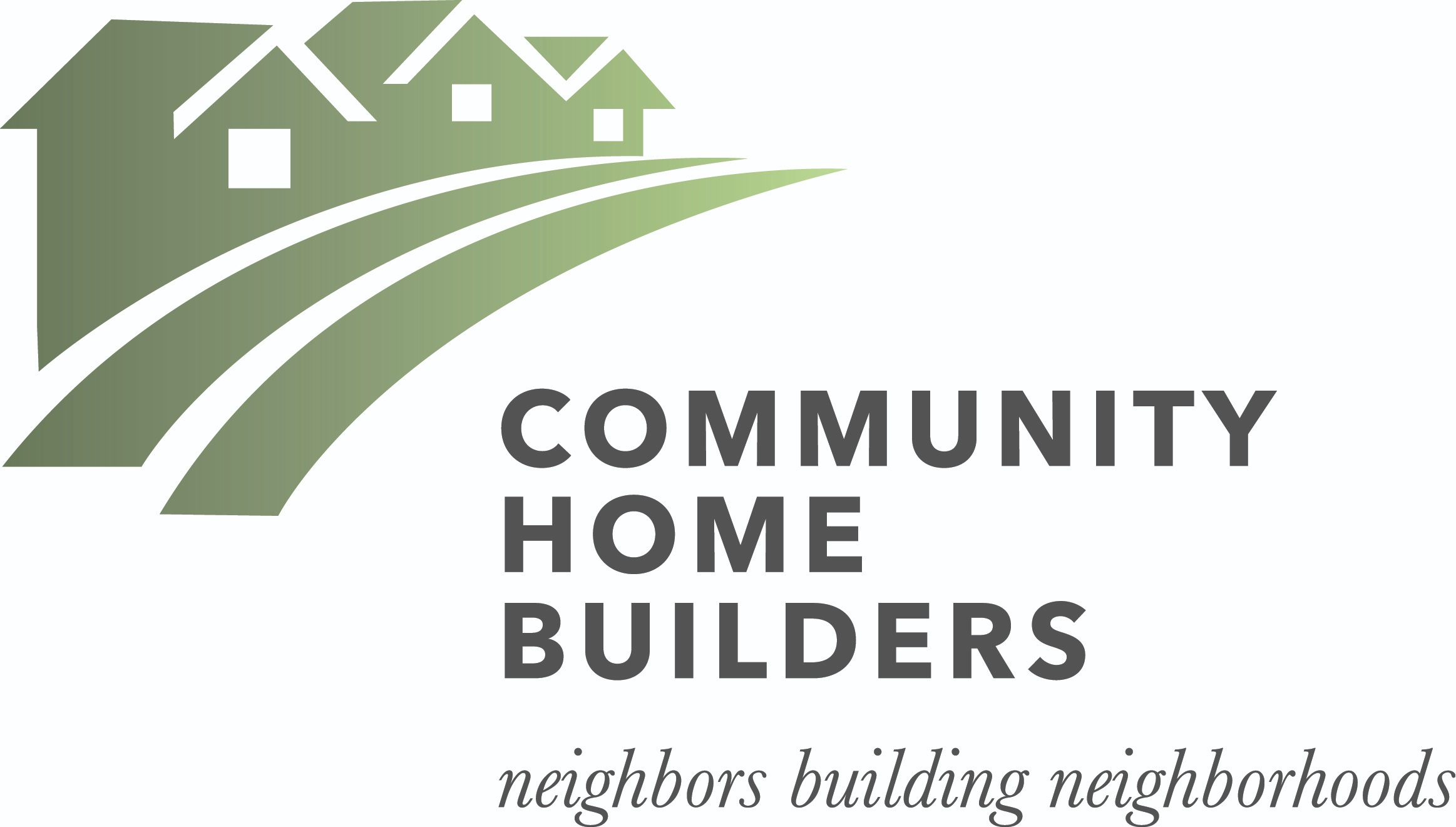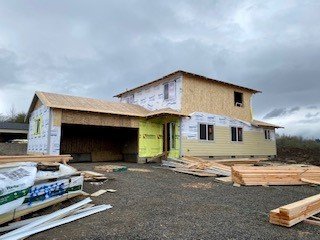Community Home Builders Receives $700,000 EEIP Grant Award from Business Oregon!
Thanks to the Oregon State Legislature passing the Equity Investment Ace (SB 1579) in the 2022 legislative session, the Economic Equity Investment Program (EEIP) was created! The purpose of the bill is to build economic equity among disadvantaged individuals, families, businesses, and communities. Business Oregon recognized the work Community Home Builders does through its homeownership program to provide services to support economic stability, self-sufficiency, wealth building and economic equity among disadvantaged individuals and families.
The grant award will help us develop land for our next project and in turn, lower the cost of the lot purchase for every homeowner! Thank you Business Oregon and Oregon State Legislature!
Future Neighbors Work Together to Build Carlton Townhomes
Starla Pointer/News-RegisterCommunity Home Builders supporters and clients look over a partially completed common wall dwelling at the Carlton construction site June 3. Started in February, the neighborhood will have 12 homes, six of them townhouses and the other single-family structures.
Several half-completed structures formed the background for the Community Home Builders’ mid-project celebration Saturday, June 3.
Homeowners, staff, board members and friends gathered to admire the growing Carlton neighborhood, which features the organization’s first townhomes. Common-wall homes make up half of the 12 homes; the rest are free-standing single-family homes.
Community Home Builders, founded in 1996, has built one other project in Carlton and several in other cities — the Whispering Meadows neighborhood off Highway 18 in the Kingwood area and a neighborhood near Columbus Elementary School among them. Other projects were in Lafayette, Sheridan, Dayton and Gervais.
Since starting construction in Carlton in early February, the future homeowners have become fast friends. That’s one of the benefits of the program, in which everyone works together to build all the homes. No one moves in until all are finished.
The collective aspect of the program is key, said Alice Springer, director of the nonprofit organization. New homeowners form bonds and build friendships as they work together.
The participants applied and were chosen based on financial need, ability to repay their mortgage loans and willingness to put in 30 hours a week of sweat equity, said Gerardo Partida, Community Home Builders’ group coordinator.
The time could be split up between a couple, or could involve friends or family members if the homeowner is single, Partida said. Either way, it’s a big commitment, he said, although working with other mostly novice homebuilders helps.
Participants work not only with each other, but also with Roger Rasmussen, the nonprofit’s construction supervisor. He advises and teaches them construction skills, from framing walls and putting up siding to installing pipes to painting.
“We have a great group of homeowners on this site,” Rasmussen said.
The soon-to-be homeowners said gaining building skills is one of their favorite aspects of the project: Knowing what’s behind the walls will give them insight into how things work and how to fix them if they break down.
They said they also liked picking floor plans, colors and styles from a palette of choices.
One future townhouse owner said, “We feel very, very blessed.”
She and her fellow builders will feel even more blessed in December, when the final tiles are installed and trim applied.
If everything stays on schedule, they’ll be celebrating Christmas in their new homes.
13 Families Break Ground in McMinnville
Lisa Mensah joined USDA Rural Development State Director Vicki Walker, local officials, and representatives from the nonprofit Community Home Builders to tour the homes being built by rural Oregonians through the self-help method in Lafayette.
National and State Officials Join CHB To Celebrate 50,000 Homes
LAFAYETTE, Oregon, June 29, 2015 — Agriculture Under Secretary for Rural Development and Oregon native, Lisa Mensah, concluded a visit to the state by meeting six families who are building their way to homeownership in Lafayette, including the 50,000th family in the nation to build their own home through USDA Rural Development’s Mutual Self-Help Housing Program.
“Since the start of USDA’s single family housing programs in 1949, we have helped more than 3 million rural residents access the dream of homeownership,” Mensah said. “This year marks the 50th anniversary of USDA’s Mutual Self-Help Housing Program, and we are celebrating the construction of the 50,000th home built through it. Homeownership is one of the best ways for American families to enter the middle class. It provides a strong foundation to help build household wealth through increased equity and assets. Simply put, homeownership means long-term financial stability for many rural families.”
This afternoon, Mensah joined USDA Rural Development State Director Vicki Walker, local officials, and representatives from the nonprofit Community Home Builders to tour the homes being built by rural Oregonians through the self-help method in Lafayette.
USDA Rural Development’s Mutual Self-Help Housing Program offers families with modest means a hands-on approach to achieve homeownership by providing grants to help local organizations carry out housing construction or rehabilitation projects in rural areas.
The local sponsor in Lafayette, Community Home Builders, is using a USDA technical assistance grant to develop a site, secure the assistance of a professional contractor, and provide construction coordination and training. The current group of participants consists of six families and marks the 200th family aided by Community Home Builders over the years.
The families, working side-by-side on nights and weekends, perform approximately 70 percent of the construction on each other’s homes, buying down the price through their sweat equity. USDA Rural Development is also providing each qualified participant an affordable, low-interest mortgage to cover the remaining cost of the homes.
“Here in Oregon, since the start of the Obama Administration, USDA Rural Development has made or guaranteed loans for nearly 17,000 rural families, representing a total investment of $2.7 billion,” Walker said.
Since 2009, USDA invested more than $117 billion nationwide to support rural homeownership. Last year alone, USDA invested $19.9 billion to help nearly 140,000 rural families buy and maintain homes.
In addition to the Self-Help Housing Program, USDA Rural Development offers direct home loans, loan guarantees, and home repair loans and grants to help qualified families in rural America achieve the dream of homeownership. To learn more about USDA’s observance of National Homeownership Month, please visit ourFacebook page, or contact a Rural Development office near you for additional information about our housing programs.
At the start of her visit to the state, Mensah traveled to Bend to meet with partners and discuss strategies for strengthening rural communities across Oregon. On Friday, she attended the Regards to Rural Conference, where she gave the keynote address, speaking about the need to build collaborations across regions and among the various sectors serving rural communities, as well as the importance of establishing long-term, integrated, holistic approaches to community economic development. USDA Rural Development is a key partner in this effort, having invested more than $3.5 billion in rural Oregon since the start of the Obama Administration. This annual conference, presented by the nonprofit Rural Development Initiatives, is focused overall on strengthening the economic vitality and social vibrancy of rural communities, a topic close to Mensah’s heart.
Mensah was nominated by President Obama for the position of Under Secretary of USDA Rural Development and confirmed by the U.S. Senate in November of 2014. Mensah provides leadership for three USDA agencies charged with improving the economic well-being of rural America: the Rural Housing Service, the Rural Utilities Service, and the Rural Business and Cooperative Service. Together, these agencies make up the Rural Development mission area of USDA, providing critical infrastructure investments in the form of loans and grants for rural housing; high-speed broadband access; telephone, electric, and water utilities; renewable energy generation and conservation; local and regional food systems; community facilities; and small business development in rural America.
President Obama’s historic investments in rural America have made our rural communities stronger. Under his leadership, these investments in housing, community facilities, businesses, and infrastructure have empowered rural America to continue leading the way—strengthening America’s economy, small towns, and rural communities.



















